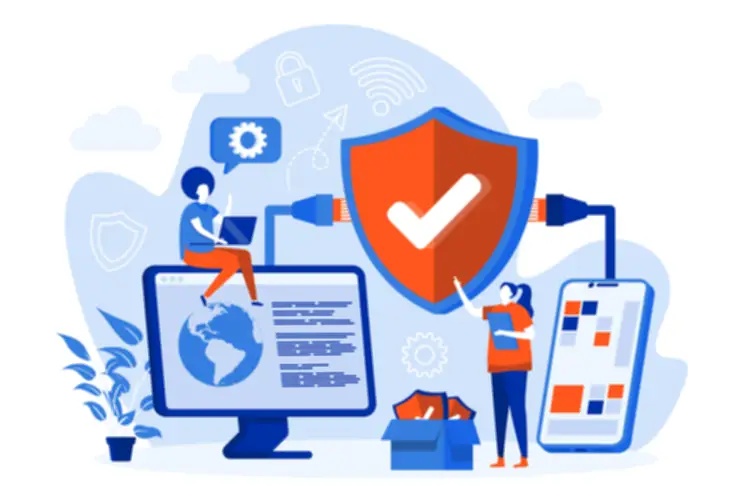Blockchain Identity Administration: Full Guide 2024
Companies typically collect delicate information about their customers and retailer them alongside less-sensitive routine enterprise information. This creates new business dangers with the rise of consumer privacy-centric regulations corresponding to GDPR and the shifting trade focus to corporate IT accountability. When these data are relegated to tight-lipped data vaults, they become much less helpful blockchain identity management companies in driving product improvements and attaining true buyer understanding. Only after receiving large fines or developing stronger IT capabilities will many enterprises pursue expensive and risky projects to realize the best steadiness between data safety and enterprise needs. Once data is added to a blockchain, it can by no means be completely deleted or altered, which is why it is essential to by no means add personally identifiable data on a blockchain. Individuals who are accessing websites and apps have full management and possession of their digital identification.
Handle Your Portfolio –wherever You May Be
They can also help in choosing the proper consensus mechanisms, sensible contract design, and security protocols to make sure easy and effective integration. Traditional identification techniques are prone to single factors of failure, making them weak to cyberattacks, natural disasters, and system outages. On the other hand, blockchain consulting companies function on a decentralized community of nodes, making certain that no single entity has control over the whole system. There is rising regulation all over the world to supply more privacy protection for residents, including the rule that knowledge can’t be shared and not utilizing a user’s express consent. Using an identification administration system that leverages blockchain tech, solely the customers store their information and only they will determine whether or not to share it or not. Also, blockchain expertise can enable information to be verified with out essentially revealing personally identifiable particulars or more info than is critical for a function.
Depin Improvement For Cross-chain Protocols With Enhanced Interoperability

Moreover, the platform would offer the mechanism and features wanted for DPKI. Another key good thing about a decentralized id is that it can act as a passport to entry a number of ecosystem applications. By utilizing blockchain to handle your information, your id shall be saved inside your sovereign blockchain address instead of on a server or in a database run by a 3rd party. You your self will take pleasure in management of that address through your non-public key, offering the ultimate id administration system that offers entry solely to you. The digital id panorama needs more blockchain digital identification companies to revolutionize the way in which customers can capitalize on digital identity. Users could juggle totally different identities with the usernames and passwords for the websites.
Organizations Use More Complicated Id Data
Smart contracts emerge as a cornerstone of id verification on the blockchain. These self-executing contracts automate, secure, and transparently execute verification processes without intermediaries. They redefine trust in identity transactions, making certain effectivity and reliability. The substantial maintenance costs of conventional identification management systems pose monetary pressure. Routine updates and addressing safety vulnerabilities demand appreciable sources. Organizations are compelled to explore cost-effective options, emphasizing the urgency for sustainable and environment friendly options.
Blockchain For Digital Id: The Decentralized And Self-sovereign Identity (ssi)
These features empower users to control and profit from their personal knowledge, aligning with regulatory requirements and market tendencies. The relevance of digital identification would be the idea for answering the query, “What is digital identification administration in blockchain? ” The buyer onboarding process should be sped up whereas accuracy is guaranteed. Digital identification can be needed for combating fraud and money laundering, that are inextricably linked. With digital identification management, government providers to people could additionally be streamlined and standardized. Blockchain enables DPKI by creating a tamper-proof and trusted medium to distribute the asymmetric verification and encryption keys of the identification holders.
Key Elements Of Blockchain Identification Methods
They play an important position in maintaining the trustworthiness of the blockchain. In id verification, consensus algorithms make positive that once a user’s id data is added to the blockchain, it’s accepted and acknowledged by the bulk, guaranteeing knowledge accuracy and trustworthiness. While nonetheless in early stages, SSI has the potential to revolutionize digital identity management. Key challenges embody growing world standards, creating supportive regulatory frameworks, and educating customers. Initiatives like the ID2020 Alliance and the Decentralized Identity Foundation are working to advertise SSI adoption, aiming to make it the usual for digital id administration in the digital age. In today’s digital economy, the concept of digital id has turn into integral for safe and efficient on-line interactions.
Having a correct method to identify ourselves and our possessions permits us to create thriving societies and world markets. At its most basic level, id is a group of claims about an individual, place or thing. For folks, this usually consists of first and last name, date of start, nationality, and some type of a national identifier similar to passport quantity, social safety quantity (SSN), driving license, etc. These information factors are issued by centralized entities (governments) and are saved in centralized databases (central authorities servers).
- It generally consists of a username and password mixture, permitting customers to entry numerous accounts, from social media platforms to online buying websites.
- We can build systems utilizing self-sovereign-identity frameworks or zero-knowledge tech, that put YOU in cost of your information.
- This allows person info to be stored on a public ledger/source of reality while concurrently sustaining privateness of it.
- In this whitepaper, we start by describing the present state of affairs with identification, how we obtained right here and describe some of the points that we have to overcome.
Unlike centralized storage systems, identification knowledge and Verifiable Credentials are stored on people’s individual gadgets and not even on the blockchain itself. This makes it harder for unhealthy actors to entry lots of personal data at once. With centralized storage techniques, a hacker may obtain 20 million accounts at once. But with decentralized storage, the hacker must hack 20 million gadgets. A solution to those issues is the use of decentralized identifiers (DIDs) to log in and entry web sites, apps, and services. A decentralized identifier is a globally distinctive identifier made up of a string of letters and numbers that’s stored and managed in a digital wallet.
Legal uncertainties round data protection, cross-border data transfer, and digital identification standards can pose challenges to the implementation of blockchain-based id management techniques. DECO allows oracles to attest to the validity of information in trusted databases/systems without exposing it to the common public and even the oracle itself utilizing a cryptographic approach often known as Zero Knowledge Proofs. Essentially, the oracle can be a part of a user-initiated internet session to attest to some requested information— presumably to confirm someone’s identification, approve their financial info, or verify key authorities records. This permits for a privacy-preserving plug-and-play option that mixes the usability of legacy methods with the security of blockchain. One particularly promising use case for blockchain expertise is to enhance the D-ID expertise by making use of one of the best options of blockchain expertise to legacy D-ID methods.

You must be taught about the present state of digital identity before reflecting on digital identification blockchain tasks and their performance. Ensure that the blockchain answer is scalable to deal with a growing number of users and transactions without compromising efficiency. Scalability is essential for the long-term viability of a digital identification system. Blockchain is a decentralized, shared ledger used to record transactions and track digital assets. Decentr is a project that aims to supply a Web3 version of credit scores—what they call a “Personal Data Value” (PDV). Each user’s PDV can be sourced from a potential mixture of social media activity, on-chain exercise similar to their complete owned belongings and history of repaying loans, and real-world knowledge corresponding to KYC/AML data.
However, a lot of you must have doubts relating to the role of blockchain in digital id. Let us assume the instance of the working of decentralized digital identities on Ethereum to search out the answer. Identity is not a difficult concept for firms and individuals but additionally for IoT devices. The world could have greater than 10 billion gadgets related to the internet in 2020, and the number would possibly grow to 22 billion by 2025. Majority of IoT applied sciences don’t make use of appropriate identity and access management capabilities.
At the identical time, security takes one step again as a tradeoff for implementing fundamental administration capabilities in IoT devices. Therefore, it is essential to be taught extra concerning the impression of blockchain technology on digital identification and the way transformative it may be. The following publish offers an in depth define of the impression of blockchain on digital identity and helps you verify whether blockchain is a reliable guess in relation to digital identity. Timestamp data on the blockchain meticulously craft a chronological and unalterable history of identity transactions. This not only creates a trustworthy audit path but additionally guarantees the integrity of the entire identity verification process.

